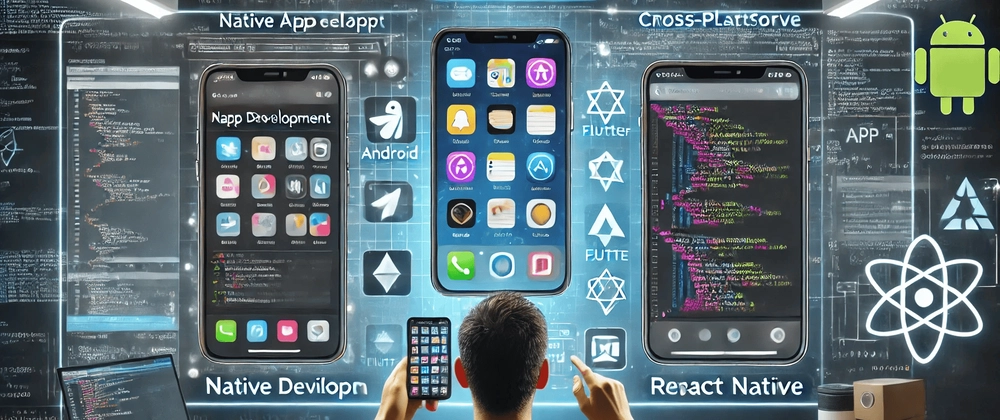If you’re planning to build a mobile app, one of the first and most crucial decisions you’ll face is choosing between Flutter app development and native development.
Should you go with Flutter, Google’s cross-platform framework, or opt for native development using Swift (for iOS) and Kotlin (for Android)?
Both approaches have their strengths and weaknesses, and the right choice depends on your business goals, budget, and app requirements.
In this guide, we’ll break down the pros and cons of both Flutter and native development, helping you make an informed decision for your next project. Whether you’re a startup, business owner, or part of a mobile application development agency, this comparison will give you clarity!
Understanding Flutter App Development
Flutter is an open-source UI toolkit created by Google that allows developers to build natively compiled applications for mobile, web, and desktop from a single codebase. It uses the Dart programming language and comes with a rich set of pre-designed widgets.
✅ Pros of Flutter App Development
🔥 Cross-Platform Development: One of the biggest advantages of Flutter is that you can develop apps for iOS, Android, web, and desktop using a single codebase. This dramatically reduces development time and costs.
🔥 Faster Time-to-Market: With features like hot reload, Flutter developers can make real-time changes without restarting the app, leading to faster iterations and quicker deployment.
🔥 Consistent UI Across Platforms: Flutter comes with a rich library of customizable widgets, allowing developers to maintain a consistent design across all platforms while ensuring a native-like experience.
🔥 High Performance: Unlike some other cross-platform frameworks, Flutter apps are compiled into native ARM code, which ensures smooth animations and responsiveness.
🔥 Flutter Web Development Services & Scalability: Beyond mobile apps, Flutter web development services allow businesses to expand their reach by creating progressive web applications (PWAs) without extra effort.
❌ Cons of Flutter App Development
🚧 Larger App Size: Since Flutter includes its own rendering engine, the resulting app size tends to be larger than native apps, which may be a concern for users with limited storage.
🚧 Limited Native APIs: While Flutter has a vast library of plugins, some device-specific features may require writing native code. This can slightly reduce the benefits of using a single codebase.
🚧 Dart is Not as Popular: While Flutter is growing rapidly, Dart is not as widely adopted as Swift, Kotlin, or Java, meaning fewer developers have expertise in it.
🚧 Early-Stage Ecosystem: Compared to native development, Flutter is still evolving. Some third-party libraries may not be as mature or optimized as those available for native platforms.
## Understanding Native App Development
Native development means building apps specifically for a particular operating system using platform-specific languages and tools:
Swift or Objective-C for iOS (Xcode)
Kotlin or Java for Android (Android Studio)
✅ Pros of Native App Development
🔥 Best Performance: Since native apps are built directly for the operating system, they run faster, smoother, and more efficiently than cross-platform solutions.
🔥 Access to Latest Features: Native development allows developers to implement new OS features instantly, while Flutter may take some time to support them.
🔥 Better User Experience: Native development gives developers greater control over UI/UX, allowing them to create applications that feel more intuitive and seamless.
🔥 Robust Security & Stability: Native apps are generally more stable and secure, making them ideal for applications that handle sensitive data (e.g., banking apps).
🔥 Stronger Community Support & Ecosystem: Both Android and iOS have mature development communities, extensive documentation, and a vast collection of ready-to-use libraries.
❌ Cons of Native App Development
🚧 Higher Development Costs: Since separate codebases are required for iOS and Android, businesses often need to hire two sets of developers—which increases costs.
🚧 Longer Development Time: Developing two native apps takes significantly more time than using a cross-platform framework like Flutter.
🚧 Limited Code Reusability: Code written for Android cannot be used for iOS and vice versa. Each platform requires unique development efforts.
🚧 Ongoing Maintenance Complexity: Maintaining two separate apps means higher maintenance efforts and costs in the long run.
Which One Should You Choose?
The decision between Flutter and native development depends on:
✔ Budget & Timeline– If you have limited resources and want to launch on both platforms quickly, Flutter app development is a smart choice.
✔ Performance Requirements– If your app requires high-end performance, native development is the way to go.
✔ User Experience – For a seamless, platform-native feel, native apps offer better UI/UX consistency.
✔ Future Scalability – If you plan to expand to web or desktop, Flutter web development services allow you to reuse code across multiple platforms.
✔ Complexity of Features – If your app needs deep integration with native device features, native development may be the better option.



Top comments (0)